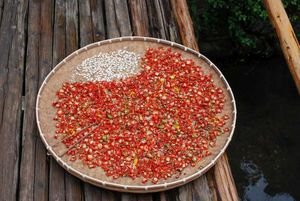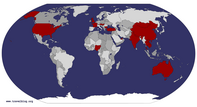Advertisement
Published: August 26th 2007

 This Made Me Hungry
This Made Me Hungry
Does it work for you?A Lesson in How To Make the Best of a Bad Situation
Wuyuan is a part of north-eastern Jiangxi province known for having a collection of relatively unadulterated and authentic Chinese villages. Only recently being discovered by tourists, the area promised a great deal of relaxing old world Chinese-ness so I added it to my agenda without much argument. However, I was still in a hurry to make my way north so I limited my stay to just one village. I thought that if I explored one place thoroughly, rather than six places half-heartedly, I might get an idea of what it was like to live in the old China.
Arriving in the town of Likeng (Xiao Likeng for those who want to go there, I suspect the list will be short) on the back of a hired motorbike taxi - my favourite mode of transport that doesn’t have me in the driver’s seat - I found exactly what I hadn’t been expecting: the town was a tourist attraction. I was perhaps thinking that it would be a normal little town with a special “touristy” section, but instead I found a ticket office on the road leading to the
village! The entire place is now designated as a money making place, a new elevated highway is being constructed behind a ridge which will bring even more tourists, the streets are filled with dodgy antique stores, the people unhappily sit around trying to get a penny here or there, and the entire area seems like a museum with a less than enthusiastic curator.
But that is what happens when tourists “discover” a new location, I should have been expecting as much (curses for being so slow). Nevertheless, the town was a tourist attraction for a reason so that at least should have been preserved. However, when the attraction is a serene location, a small town with houses clustered on the banks of two small rivers (creeks), stone pathways lined with lanterns, peace, quiet, beauty and calmness, the attraction is very quickly overrun by tourists and becomes significantly less appealing.
To be fair, Likeng is still beautiful, don’t get me wrong. The idyllic streams (when you overlook the rubbish), the old entrance-ways, the old folk hiding in the back alleys, the farmlands beyond the town, and the old buildings themselves, these things remain and are striking by themselves, but

 One of the Brothers
One of the Brothers
This is the one with a penchant for skulling 600mL beers.the overall feel of the town is that of a tourist trap. I couldn’t help feeling unhappy while surrounded by it all and I certainly didn’t feel as though I was walking around in the Ming dynasty.
So what does one do in such a situation? I reverted to my old ways and tried to find something that is always hard to find in China: decent coffee.
I entered the nicest looking restaurant/bar/hotel building and headed for the balcony area which overlooked the rivers and the houses. There I was quickly accosted by what I can only describe as the most friendly people on Earth. Three Chinese brothers, one of their wives and their daughter called me over to their table and offered me a seat. From then on I was stuck, there was no escape. Failing to get coffee (they only had instant) I settled instead for beer, which was of course in plentiful supply thanks to the Chinese hosts I had run into. In case I haven’t done it before I will now describe to you what I refer to as “the Chinese drinking culture”. I refer to it in this way for two reasons: one

 Doorway
Doorway
Typical Likeng scene.is that it is the most obvious and accurate description, the other reason is that “binge drinking for free” sounds significantly less dignified.
I sat down at the table and was instantly provided with a cup full of beer (it was a porcelain tea cup no less) and a smiling Chinese man, Lao Zhu, who was already fairly well under the weather was smiling at me with his cup raised. It is impolite to refuse such an offer so I clicked cups with him, he said those horrible words “gan bei” which indicate that you should finish your drink (more accurately, they indicate that the one who said it will finish their drink and it would be rude of you to not follow suit) and downed the first of many glasses that day. The real problem is not the “gan bei” itself, the bigger issue is who is included in the drinking. More often that not, only two people take a drink at a time, and the one initiating the drinking gets to choose who he drinks with. Therefore, being somewhat of a novelty as the only white person at the table, and in the entire region most likely,
I was almost always involved. Whenever one of the other three drinkers felt thirsty I was asked to drink. I.e. I was asked to drink three times as often as anyone else, and this can be a problem.
Despite this issue, I wasn’t the worst off. Lao Zhu fared fairly badly and I found out later that he had drunk a substantial amount of Hong Jiu (Chinese red spirit) before I had arrived; eventually he was taken away by his wife and daughter. At about this point the questions of “how many beers can you drink?” came across the lips of Yu Da, the eldest brother, which somehow translated into “lets drink whole bottles” when it passed from one ear to the other of the third brother. All of a sudden I was handed a full beer and, yes, I think I can hear those words coming again: Gan Bei!
I wasn’t fairing very well, but at least I’m big enough to be able to withstand all but the most enthusiastic Chinese party (I have often been destroyed to the point of havoc by this drinking culture), and thankfully my Chinese friends all decided to go and sleep
it off before the hospital had to be called. We agreed to meet again for dinner (oh no) and parted ways.
At dinner time I was approaching the point where I though it might be possible that sometime the following day I could be legally considered sober, when it all started again. Two of the brothers arrived a touch late, the third not at all, and we ate a relatively quiet dinner together while delicately sipping on tea and beer (they taught me tea etiquette as well). I avoided all possible occurrences of drinking, I even reverted to barely touching the drink on each sip, and somehow we all survived the evening. However, the hospitality of my friends had started to kick in. They had already paid for my dinner and all drinks that day, something that I was incredibly grateful for (even the poorest Chinese person will happily pay for my dinner no matter how much I demand that I pay for myself), and then they offered to drive me to Huang Shan the following day so as to save me the bus fare.
I don’t like taking too much charity from local people, they are after
all a lot worse off than I am, but it is next to impossible to talk a Chinese person out of something once they have made up their minds. From the point that one of the brothers suggested I go with them the idea was taken up by the others and I was stuck; I would never be able to refuse the offer while they lived. So, the following morning they put me in their car, they drove me 100km up the road, they bought me another meal (and drinks), they put me on a small local bus to my next destination (they were travelling a different direction from there), and they paid for my ticket. All in all, they gave me everything, even Chinese lessons, and I gave them nothing more than my presence. If ever you wonder about the friendliness or kindness of the Chinese you are mistaken, they are simply the most wonderful people in the world.
One other issue came out of my time with the brothers. One that caused me some distress I must say. Yu Da has a daughter living in Shanghai, my second-to-next destination, and he gave me her contact details. Then
he rang her, asked her to show me around Shanghai (to make sure I had a proper coffee), made me promise to ring her when I got there, and gave me 500 yuan ($60 US) to give to her to pay for everything we did there. He trusted me, a virtually unknown stranger, with his money and his daughter, he practically set us up on a date in Shanghai at his own expense. Watch this space to find out what happened.
Advertisement
Tot: 0.214s; Tpl: 0.012s; cc: 27; qc: 116; dbt: 0.0758s; 1; m:domysql w:travelblog (10.17.0.13); sld: 1;
; mem: 1.6mb



















Kiwi Steve
non-member comment
Go For It !!
Perhaps 'Brother' has plans for you to become 'Son' ???? Great writing, Keep it up !